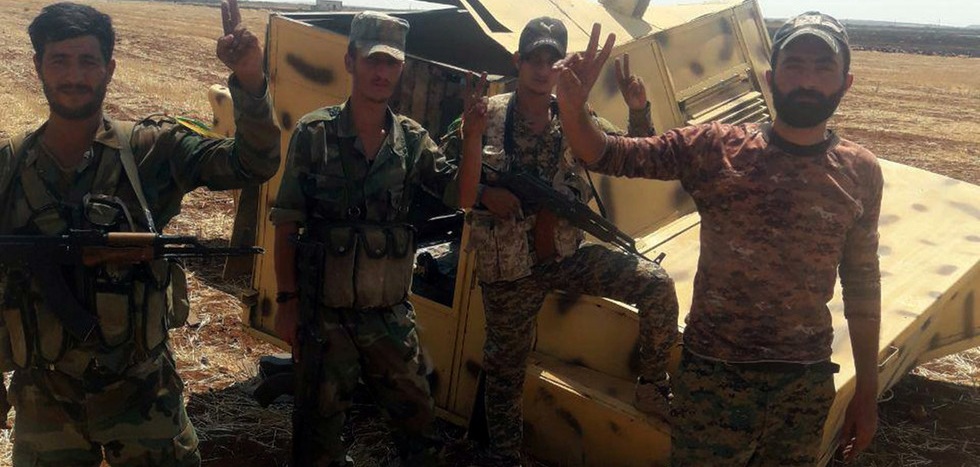Alwaght- The Syrian Arab Army’s units keep advancement in the outskirts of the two provinces of Idlib and Hama after their last week triumphant recapture of Khan Sheikhun as the largest town in Idlib’s southern suburbs. According to Qatar’s broadcaster Al Jazeera, the terrorist groups in Kafr Zita, Al-Latamna, Al-Saiad, Latmin, Al-Lahaya, Al-Bowaidha towns in Hama’s northern outskirts have begun to flee their positions amid fear of encirclement and cutting off the lifelines by the Syrian army. The government lost these regions in 2012, less than a year after the eruption of the foreign-backed terror war, and the new developments mean that it is recapturing them after seven years, indicating the significance of a process to obliterate the terrorism in the country and renewed control of Damascus over the whole Syrian regions.
Following these advances, in an important development, a Turkish-operated base, dubbed Station 9, in Murek village as one of the 12 bases operated by the Turkish forces in Idlib and outskirts have been fully encircled by the Syrian forces. The center has lost its ground links to Idlib and its Turkish command in the Syrian province. This encirclement beside last week’s Syrian air raids on position just close to a Turkish army convoy in Idlib, according to the political analysts, raise the stakes of a direct military confrontation between Syria and the intrusive Turkish forces. Turkey, dismissing the warnings and denying that a position of its army is now surrounded by the Syrian troops, announced that it will not quit its bases in Idlib, the last major stronghold of the terrorist groups in Syria.
Turkey’s Foreign Minister Mevlut Cavusoglu, who has been on a trip to Lebanon, has said that his country has no plan to leave the Syria-based position and that “we are there because we want it not because we cannot leave it.” This comes while there is no way for Ankara to provide its forces with power, fuel, food, and equipment. The dominant notion is that they cannot remain for a long time in their position even if the Syrian army refrains from taking a military action to seize their base by force.
Turkey’s hard choices
Turkey, apparently predicting such a hard situation for its influence in Syria, used all of its tools in the last round of Astana initiative talks to block the Syrian army’s advancement. It even succeeded in persuading the two sides to accept a ceasefire. However, as the terrorist militias showed a lack of commitment, the Syrian government withdrew its commitments and started a push into Idlib.
Now the choices at Ankara’s disposal are not favorable to Erdogan. He is now left between choosing to directly confront the Syrian forces or through contacts with Russia and Iraq find a way out of the crisis without clashes. It seems that the second one will be Turkey’s choice despite the Turkish FM’s emphasis on staying in their positions. Kremlin on Friday said that the Russian President Vladimir Putin and his Turkish counterpart have agreed to “reactivate bilateral efforts” to calm the situation in Idlib. Moreover, the media said that Erdogan will visit Moscow on Tuesday before the next month Sochi summit for talks with the Russian leader.
Over the past few months, Russia showed ironclad support to Idlib recapture campaign of the Syrian government, particularly after the Russian Khmeimim airbase in Latakia came under drone attack of Turkish-backed al-Nusra terrorist factions, setting off the alarm bells to Moscow and its allies that during the calm facilitative by the ceasefire the terrorists have gained access to modern combat equipment. Arabi Al-Yaum news of Syria in a report said that during the attack on the Turkish army convoy en route to Idlib the Russian fighter jets blocked an intervention by the Turkish jets that were deployed to provide cover to the convoy.
It is expected that following the scheduled meeting between Putin and Erdogan this week, the Turkish forces under encirclement will be allowed to move from Murek village to the more northern regions where they have a watch post. This means that Hama will be added to the list of terrorist-free regions 100 percent under the control of Damascus administration.
Golden opportunity for victory
Since September last year, the Syrian government developed a determination to liberate Idlib from under the yoke of the foreign-supported militias. But due to the Russian caution and the Turkish argument that it will unleash new influxes of Syrian refugees to the Turkish border, Damascus declined to start its anti-terror strikes. But now the attacks on the terrorists in Marrat an-Numan just 25 kilometers away from Khan Sheikhoun indicate that Syria will not stop after Khan Sheikhoun liberation and will press ahead its campaign until reclaiming all of Idlib and suburbs. Control on this region is of strategic importance because the highway that crosses Khan Sheikhoun marks a lifeline connecting major Syrian cities. The highway links Aleppo in the north to Hama, Homs, Damascus, and from there to the Nasib border crossing with Jordan.
The terrorist groups are now on shaky ground and their clout in Idlib is apparently declining. Turkey seeks to use the experienced policy of buying time during the talks with the Russians to rebuild their strength. With Turkish distrustfulness now clear to Moscow and the Syrian army being in the position of an equation maker now, Damascus will certainly not miss the golden opportunity to retake the strategic city under its control.



























